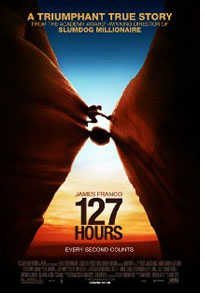Franco Brings, Humor, Humanity to 127 Hours
 – John DeCarli
– John DeCarli
Danny Boyle makes films that move. His films are at their best when they’re visceral and kinetic, bursting with nervous energy, and hiker Aron Ralston’s story is just the right pitch for Boyle. After all, there’s nothing subtle about self-inflicted amputation.
Predictably, the best moments of 127 Hours are the same hyper-active highs that animate Trainspotting: quick cuts, creative camerawork and an edgy attitude. Boyle wisely mixes these frantic scene with moments of patience, and he exhibits a keen feel for rhythm and pacing, finding an ebb and flow to match Aron’s emotions. While he experiments with a nice variety of paces, Boyle struggles with the quiet beats. When it’s time for Aron to learn a lesson, for example, his revelations are blunt and obvious, rather than arising naturally from his the strange serenity of his solitude.
The subtle moments that do land, however, work, thanks to a rich performance from James Franco. Aron’s strong, funny, down-to-earth loner is a great role, but in less capable hands, the character could have felt like a cartoon or a martyr. Instead, Franco finds a balance between Aron’s recognizable humanity and his exceptional courage. Despite his harrowing ordeal, Aron is simply flesh and blood, rendered human thanks to Franco’s quirks. A little humor goes a long way in brightening up this grisly affair, and thankfully both Boyle and Franco (and Aron, it seems) understand the inherent absurdity of the situation.
Much has been made of the amputation scene. While there was no fainting or vomiting in my theater, it is a powerful scene, more for the sheer immediacy of the action than for the gore. Boyle doesn’t shy away from the blood, though, but then neither did Aron and neither should we. It’s the right choice for a film that places so much emphasis on the fragile machine that is the human body. Well, here it is in all its bloody glory.